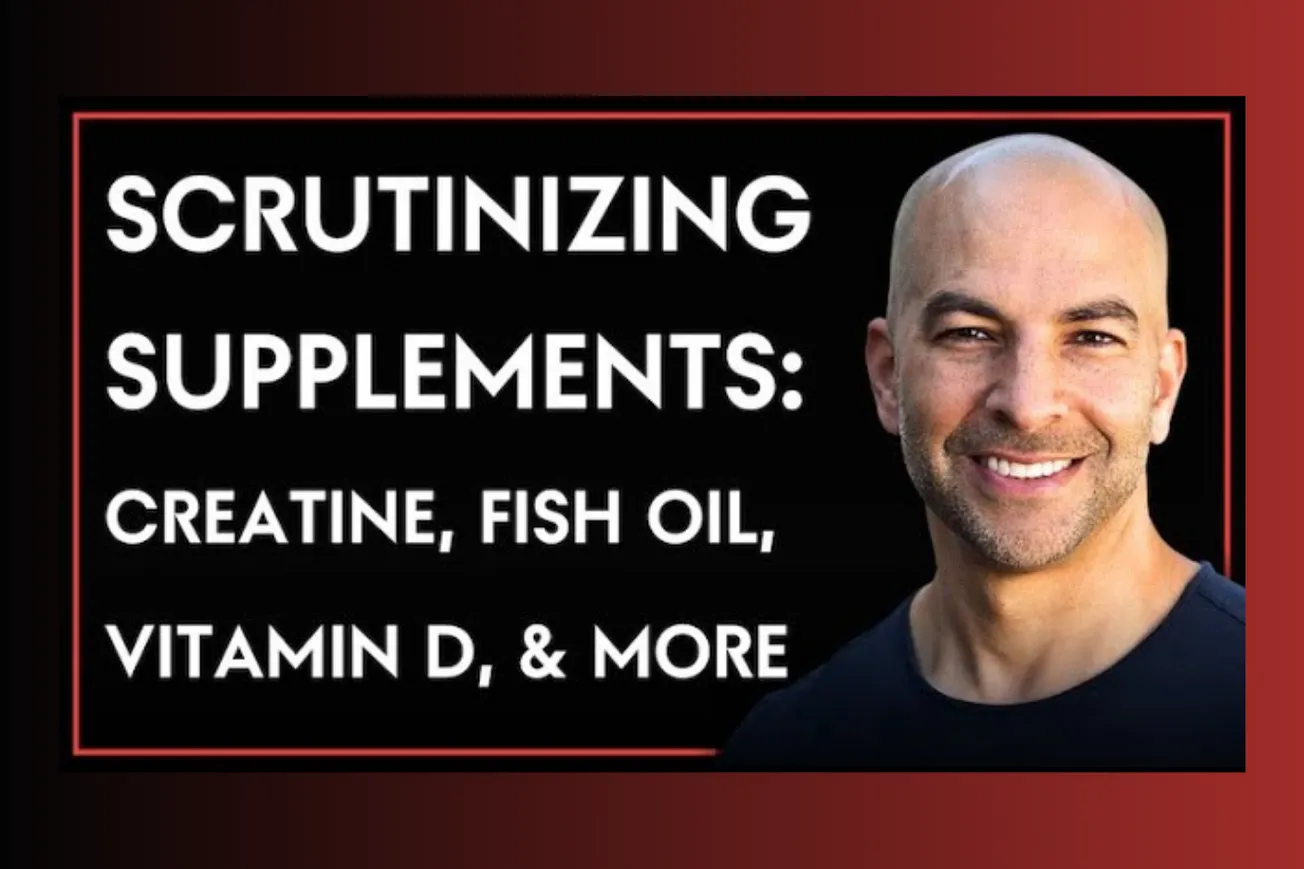Table of Contents
A systematic approach to supplement decisions using evidence-based criteria, featuring comprehensive creatine analysis from leading longevity expert.
Key Takeaways
- Six critical questions determine whether any supplement deserves a place in your routine
- Creatine delivers measurable 5-15% improvements in muscle performance with robust safety data
- Most supplements lack proper biomarkers to track effectiveness, requiring protocol-based approaches instead
- Quality concerns plague the supplement industry far more severely than pharmaceutical manufacturing
- Women may benefit disproportionately from creatine due to lower baseline muscle stores
- Deficiency correction differs fundamentally from achieving supraphysiologic levels for performance enhancement
- Evidence-based frameworks prevent ideological thinking about "natural" versus pharmaceutical interventions
- Creatine monohydrate remains the gold standard with no compelling alternatives in the market
- Regulatory oversight for supplements falls drastically short compared to prescription medications
The Six-Question Supplement Evaluation Framework
- Rather than randomly adding supplements based on social media recommendations or outdated advice, Dr. Peter Attia advocates for a systematic approach that mirrors how kidneys filter essential molecules—dump everything out, then methodically decide what deserves readmission to your daily routine.
- The first critical question examines whether you're correcting a genuine deficiency or attempting to achieve supraphysiologic levels that exceed normal ranges, since these represent fundamentally different therapeutic approaches with distinct risk-benefit profiles and monitoring requirements.
- Question two focuses on your primary objective: are you targeting lifespan extension, healthspan improvements, or both, since this distinction shapes everything from dosing strategies to success metrics and helps avoid the common mistake of taking supplements without clear goals.
- The third inquiry dives deeper into mechanism specificity—if you're pursuing lifespan benefits, are you targeting a particular disease process or seeking broader geroprotective effects, which remain relatively rare in the supplement landscape compared to pharmaceutical interventions.
- For healthspan goals, you must identify which domain you're targeting: physical performance enhancement, cognitive optimization, or emotional wellbeing, since supplements rarely deliver benefits across all three areas simultaneously and focused approaches yield better results.
Understanding Supplement Quality and Regulation Gaps
- The regulatory landscape for supplements presents massive quality control challenges that consumers rarely appreciate, with FDA oversight limited to "generally regarded as safe" designations that lack the rigorous testing protocols required for pharmaceutical approval.
- Manufacturing quality issues that exist in generic pharmaceuticals get amplified by factors of 10 to 100 in the supplement industry, where third-party testing remains optional and contamination, mislabeling, and potency variations occur with alarming frequency across even reputable brands.
- The ideological divide between "natural supplements" and "pharmaceutical drugs" creates false distinctions that prevent rational decision-making, especially when considering that high-dose red yeast rice functions essentially as a modest pravastatin dose with less quality control.
- Consumer education about these realities becomes crucial for making informed choices, since the marketing machinery surrounding supplements often obscures the fundamental truth that any molecule entering your body deserves the same analytical rigor regardless of its regulatory classification.
Creatine: The Gold Standard Supplement Case Study
- Creatine supplementation targets supraphysiologic levels rather than deficiency correction, with 3-5 grams daily proving sufficient to maximize muscle stores without requiring the outdated loading protocols that once dominated bodybuilding culture with their 20-gram daily doses.
- The mechanism of action centers on phosphocreatine's role as a phosphate donor for ATP regeneration, making creatine particularly effective for explosive activities lasting 10 seconds or less, like sprinting, where the phosphocreatine system provides primary energy without requiring oxygen delivery or anaerobic glycolysis.
- Research demonstrates consistently impressive performance improvements in the 5-15% range across multiple parameters including power output and muscle hypertrophy, with the hypertrophy benefits arising from both increased myofibril thickness and enhanced intramuscular water retention that still counts as lean mass.
- Women appear to derive even greater benefits than men due to lower baseline creatine stores from reduced muscle mass and potentially decreased dietary intake, making supplementation particularly valuable during periods of hormonal fluctuation including menstrual cycles, pregnancy, and menopause when creatine pathways face disruption.
The absence of reliable biomarkers for tissue creatine levels means users must follow evidence-based protocols rather than titrating doses based on blood work. Safety considerations include potential kidney function interactions and the critical importance of informing healthcare providers before creatinine testing, since creatine supplementation can artificially elevate this kidney function marker.
Cognitive Benefits and Emerging Research Directions
- Brain tissue synthesizes small amounts of creatine naturally and the blood-brain barrier permits creatine passage, though uptake occurs at significantly lower rates compared to muscle tissue, suggesting cognitive benefits may require higher doses than those used for physical performance enhancement.
- Recent meta-analyses examining 16 randomized controlled trials found positive effects on memory function, while emerging research suggests potential benefits for slowing age-related cognitive decline, though the evidence base remains less robust than for physical performance applications.
- Depression reduction in women represents an intriguing research direction with preliminary supporting data, potentially linked to creatine's role in brain energy metabolism and its interaction with hormonal pathways that influence mood regulation and cognitive function throughout various life stages.
- The cognitive research landscape continues evolving rapidly, with scientists exploring optimal dosing strategies, timing protocols, and combination approaches that might unlock creatine's full neurological potential while maintaining the excellent safety profile established through decades of muscle performance research.
Creatine monohydrate remains the only form worth purchasing, avoiding unnecessary fillers or marketing gimmicks that add cost without benefit. The supplement offers exceptional value with minimal risk when sourced from reputable manufacturers focused on purity rather than proprietary blends or exotic variations that lack supporting evidence.





